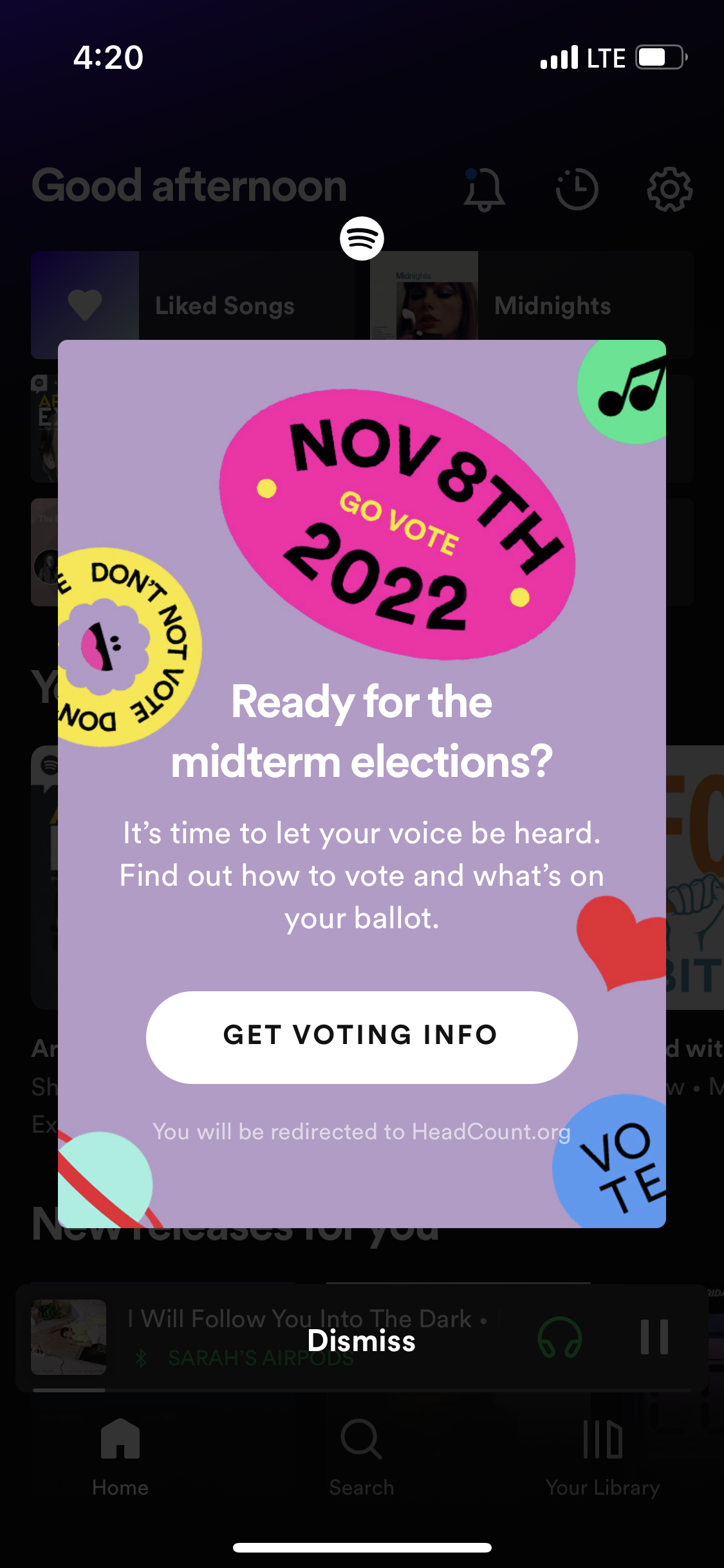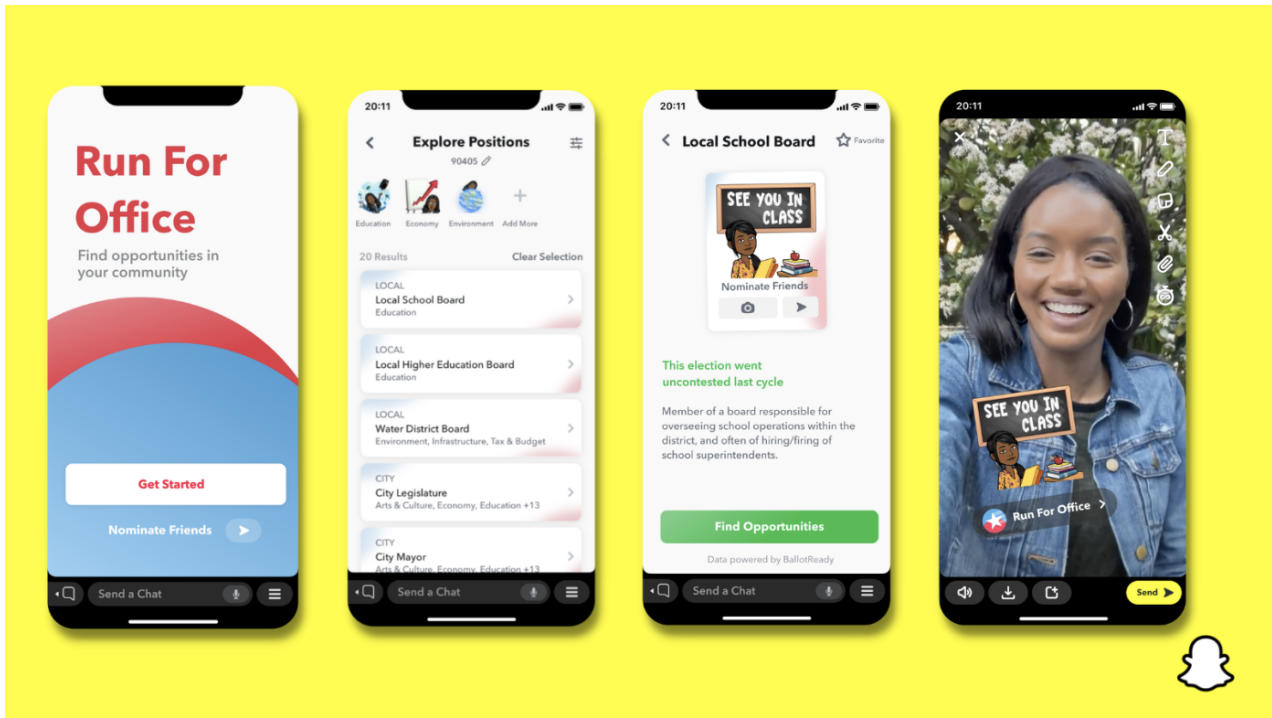Civic Engagement for Companies
Sign up below to download the Harvard case study outlining:
How brands can positively effect voter turnout and engagement
Why this effort is good for business and popular among consumers & employees
Recent BallotReady partnerships with Spotify and Snapchat
Introduction
Through our company partnerships, we have strived to empower brands in maximizing their civic impact. By helping prospective voters access the information they need to register, and to vote informed, brands can simultaneously build trust with their audience, promote voter engagement, and drive business.
The following research shows how partnerships with organizations like BallotReady can help companies drive civic and social engagement, earn the trust of the public, and be well-received by employees.
Plus, learn more about BallotReady’s brand partnerships including with Spotify, Tinder, Levis & Snapchat.
Civic Outreach Attempts Have Been Successful
A 2019 Harvard case study found, overwhelmingly, that brands have the capacity to get their users to the polls. Covering a number of brands (including existing BallotReady customers) which chose to offer civic resources during the 2018 midterms, the case study found that most brands engaged with election-related outreach were satisfied with their impact.
Snapchat and Spotify found success in “crafting civic engagement programs that were unique to their platforms and resonated with what users come to their platforms to experience.” Snapchat saw engagement in young users that would otherwise be less likely to vote, noting that ““There is no more powerful form of self-expression than the ability to vote. The numbers we’ve seen have been fantastic and have shown us that our users have been some of the most engaged communities out there.” They ultimately generated over 400 000 voter registrations, more than half of whom were aged 18-24. Their Election Day polling place tool saw 1.4 million users.
Likewise, Twitter saw a marked increase in election related activity on the platform from 2016 (where they had not coordinated a voter outreach strategy) despite 2018 not being a presidential election.
Consumer Supports Civic Activism
For brands, delving into social issues can be a sensitive topic. Striking balances between authentic involvement, maintaining audience trust, and avoiding alienation make approaching civic involvement challenging. Consumers on the whole, however, largely support brand activism, as a survey by Sprout Social found that “the chances of encouraging someone toward purchase are higher than pushing him or her away.”
A study from Global Strategy Group found that 79% of consumers believe that companies should be taking civic action, and 87% believe that companies influence social change. It found that consumers tend to have some trust in companies they interact with regularly which helps the perception of civic efforts.
This positive perception also drives brand trust and loyalty. One study, in the Journal of Public Interest Communications, found that people tend to attribute advocacy to genuine desire for change, as opposed to profit-driven motives - “(there) seems to be an overall level of agreement across respondents that corporations should engage on important social issues.” Two other studies, in Sustainability and the Journal of Cleaner Production, found that socially responsible outreach activities tend to create both brand loyalty and better brand identification.
Global Strategy Group also found that 81% of Americans are more likely to buy products from companies that encourage them to “participate in our democracy by providing information about issues in their community and resources to help them register and vote.” Furthermore, 92% of consumers believe it to be important that companies “take positions on issues that are in line with their values as a company.”
Staff are Receptive to Civic Outreach
Across the board, employees prefer to work for organizations that they believe to be behaving responsibly and contributing socially. An article in Rolling Stone noted that 67% of people actively prefer to work for companies that they believe to be socially responsible.
The previously noted Harvard case study, having surveyed representatives of the involved companies, stated that employees almost universally responded well to their civic outreach programs.
While these civic outreach programs can both increase electoral participation of corporate audiences and increase brand trust and brand awareness, they also help foster motivated work environments. Findings across these studies demonstrate that public social outreach promotes feelings of purpose in the workplace.
Public Relations Professionals Endorse Civic and Social Engagement
While brands find positive civic outcomes, consumers largely support these efforts, and employees appreciate mission-driven programming, public relations professionals largely find that social and civic programming is becoming essential. In the USC Annenberg Center for Public Relations’ 2022 report on corporate activism, 1600 media and public relations professionals, as well as students, were surveyed on the state of corporate activism. 85% of respondents said that businesses have a role to play in reducing political polarizations, and another 85% believe that corporations are generally trending towards heightened social advocacy. The findings of this report suggest that public relations specialists are guiding their organizations towards social and civic involvement, both to utilize their platform for good, and to maintain positive social perceptions.





